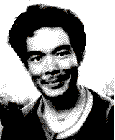|
Melody in Prison: Ngawang Choephel |
||
 |
UPDATE 24 June 1999 |
Day After Day in India, Mother Holds Vigil
By Rama Lakshmi
for Son Imprisoned in Tibet
Special to The Washington Post
NEW DELHI -- Every morning Sonam Dekyi, a thin, stooped woman of 65 whose eyes are masked by the folds of age, makes her way to a spot outside a church in the Indian capital's business district. She spreads her threadbare mat under a tree, places a framed picture on it and sits there until dusk, ready to tell her story to anybody who will listen.
Since 1995, Dekyi, a refugee from Tibet, has told hundreds of strangers the story of her son Ngawang Choephel, a U.S.-educated scholar of traditional Tibetan music and dance who vanished into a Chinese prison that year.
"I have opened my wounds to the world. What more can a mother do?" she said one recent morning, using her scarf to wipe the traffic grime off her son's photograph. Framed in gold, the picture showed Choephel playing a Tibetan stringed instrument called a drumyen.
Choephel, 31, was imprisoned on charges of spying for the Dalai Lama, the exiled Tibetan spiritual leader who is a leading international critic of human rights violations by Chinese security forces in Tibet, which China brought under its control in 1950. In 1996, he was sentenced to 18 years in prison, one of the longest terms ever given to a Tibetan political prisoner. He appealed but lost.
Choephel, who fled Tibet to India with his mother in 1968, grew up in a Tibetan refugee camp in the southern Indian state of Karnataka. He learned Tibetan folk music from other refugees and won a Fulbright scholarship to Middlebury College in Vermont, where he studied Western musical notation and filmmaking. In his project proposal, he wrote that he wanted to preserve the history and diversity of Tibetan oral traditions in music.
According to human rights groups, Choephel and a friend traveled to Tibet to film ancient music and dance forms in the summer of 1995. Together they had filmed 16 hours of video footage when Choephel was arrested. The friend, an American photographer, was allowed to leave.
"My son is innocent. He loved Tibetan music and wanted to preserve it. Is that a crime?" Dekyi asked as she prepared for another day-long protest in the sweltering Delhi heat.
Dekyi's cause has found powerful allies in the United States. In 1997, the Senate passed a joint resolution expressing concern about Choephel's imprisonment and health. Sen. Patrick Leahy (D-Vt.) has been active in prodding Beijing, Washington and the United Nations to address the case. In April, a member of Leahy's staff met with Dekyi, who asked for help in gaining permission to visit her son.
"Sonam Dekyi has fought tirelessly and courageously for the right to see her son. This is really a very simple humanitarian request that could easily be granted tomorrow," Leahy said in a statement in May. "Chinese officials acknowledge that under their own laws prisoners are entitled to receive regular visits by family members."
In addition to Leahy, Sen. James Jeffords (R-Vt.) has written to Chinese Premier Zhu Rongji, and Secretary of State Madeleine K. Albright made a personal appeal on Choephel's behalf during her visit to China last year. But, all such efforts have failed to either help Dekyi's son or allow her to visit him.
Chinese officials here confirmed that Choephel is in prison but refused to acknowledge Dekyi's existence. Zhao Xingmin, press attache at the Chinese Embassy, recently denied any knowledge of Dekyi, her four-year protest or her repeated requests for a visa to visit her son.
"I have no idea about this person," Zhao said. "The Dalai Lama and his clique are engaged in fabricating stories against us all the time. He is the tool of the Western world to separate Tibet from China. Choephel was involved in activities against China, and that is why he was put in prison, not because of the activities of a musician."
The International Campaign for Tibet, a human rights group in Washington, has viewed the videotape Choephel shot in Tibet before his arrest, and officials there said "not a single scene indicates that he was involved in any political activity."
In the meantime, Dekyi's long months of daily protests have taken a toll on her health. Last year she was hospitalized with tuberculosis. She has no income, and her noon meal usually consists of cucumbers and mangoes offered by a Hindu friend who sells them in the street. At night, she either takes a bus across town to a refugee camp or curls up and sleeps in a bus shelter.
A volunteer group in Vermont has offered to pay for her food and medical expenses, but Dekyi said she declined the offer.
"If they cannot release him, they should throw me in jail with him. I would fold my hands, bow my head and say thank you. At least we will be together," she told a group of onlookers who gathered around her. "I keep telling myself, a few more days, a few more days, and maybe my son will come home. That is how I carry on."